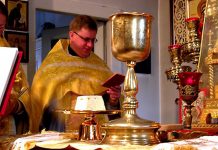Prayer for a Dead Child
O Lord who watches over children in the present life and in the world to come because of their simplicity and innocence of mind, abundantly satisfying them with a place in Abraham’s bosom, bringing them to live in radiantly shining places where the spirits of the righteous dwell: receive in peace the soul of Your little servant (name), for You Yourself have said, “Let the little children come to Me, for such is the Kingdom of Heaven.” Amen.
Basilica of St. Mary 2011-03-21T12:49:59+00:00
St. Mary Orthodox Church is a parish of the Antiochian Orthodox Christian Archdiocese of North America.
stmarylivonia.com
Pope Francis has asked for prayers for his nephew’s wife and children, who died today in a car crash in Argentina. Below, prayers for the the dead, even for the death of a child:
Prayer When A Child Dies
With a mother’s strong love
you shelter us in your shadow, Lord
and you mourn as we do the death of this child.
Hold this child gently in your hand
and help us to await in joyful hope
the resurrection of the dead
and the life of the world to come.
-Gabe Huck
Prayer for the Death of a Child
Deliver us from all evil, O God,
for we would not lose hope,
would not forget your love.
Love this child forever
as we have loved him/her.
Guide our steps in the way of peace
till with our eyes we behold you
and shall praise you with all the saints
for ever and ever.
– Gabe Huck
Order of Christian Funerals
Lord Jesus Christ,
by your own three days in the tomb,
you hallowed the graves of all who believe in you
and so made the grave a sign of hope
that promises resurrection
even as it claims our mortal bodies.
Grant that our brothers and sisters may sleep
here in peace
until you awaken them to glory,
for you are the resurrection and the life.
Then they will see you face to face
and in your light will see light
and know the splendor of God,
for you live and reign for ever and ever.
Orthodox Liturgy
O gaping earth!
Receive the body formed of you by the hand of God
and again returning to you as its mother;
for what has been to his image, the Creator has already
reclaimed,
Receive then this as your own.
Psalm 103:15-18
Surely God knows how we are made,
And recalls that we are dust!
Our human life is a reed,
A flower that blooms in the meadow.
It is gone when the wind blows over it;
Its place recalls it no more,
But the grace of the Lord is eternal,
Resting forever on those fear God.
God’s justice belongs to their offspring,
To all who keep the covenant;
Who remember to do what God commands.
Thessalonians 4:13-14
We do not want to be unaware about those who have fallen asleep, so that you may not grieve like the rest who have no hope. For if we believe that Jesus died and rose, so too will God, through Jesus, bring with him those who have fallen asleep.
On Grief
“It is the will of him who sent me that I should lose nothing of what he has given me: rather, that I should raise it up on the last day.” (John 6:39) That is our faith conviction about life in Christ. But we need to know what we do. We counter the mystery of death with a greater mystery still, the mystery of risen life. In the meantime there is grief, and nothing in Christian faith asks us to deny grief. We have known, all of us, someone who made an immense difference. We thank God for just that much. And we ask God for just enough strength to handle our grief.” – Gerard S. Sloyan
Mother of God Light in all Darkness
Mother of God, Light in all darkness,
Shelter Christ;
our flame of hope,
with your tender hands.
And in our times of dread and nightmares,
let Him be our dream of comfort.
And in our times of physical pain and suffering,
let Him be our healer,
And in our times of separation
from one another,
Let Him be our communion.
– William Hart McNichols
thecatholiccatalogue.com
Therefore, we see panikhidas and prayer at home for the dead are beneficial for them, as are good deeds done in their memory, such as alms or contributions to the church. But especially beneficial for them is commemoration at the Divine Liturgy. There have been many appearances of the dead and other occurrences which confirm how beneficial is the commemoration of the dead. Many who died in repentance, but who were unable to manifest this while they were alive, have been freed from tortures and have obtained repose.
How important commemoration at the Liturgy is may be seen in the following occurrence: Before the uncovering of the relics of St. Theodosius of Chernigov (1896), the priest-monk (the renowned Starets Alexis of Goloseyevsky Hermitage, of the Kiev-Caves Lavra, who died in 1916) who was conducting the re-vesting of the relics, becoming weary while sitting by the relics, dozed off and saw before him the Saint, who told him: “I thank you for laboring me. I beg you also, when you will serve the Liturgy, to commemorate my parents”—and be gave their names (Priest Nikita and Maria).** “How can you, O Saint, ask my prayers, when you yourself stand at the heavenly Throne and grant to people God’s mercy?” the priest-monk asked. “Yes, that is true,” replied St. Theodosius, “but the offering at the Liturgy is more powerful than my prayer.”
Therefore, we see panikhidas and prayer at home for the dead are beneficial for them, as are good deeds done in their memory, such as alms or contributions to the church. But especially beneficial for them is commemoration at the Divine Liturgy. There have been many appearances of the dead and other occurrences which confirm how beneficial is the commemoration of the dead. Many who died in repentance, but who were unable to manifest this while they were alive, have been freed from tortures and have obtained repose. In the Church, prayers are ever offered for the repose of the dead, and on the day of the Descent of the Holy Spirit, in the kneeling prayers at vespers, there is even a special petition “for those in hell.”
St. Gregory the Great, in answering in his Dialogues the question, “Is there anything at all that can possibly benefit souls after death?” teaches: “The Holy Sacrifice of Christ, our saving Victim, brings great benefits to souls even after death, provided their sins (are such as) can be pardoned in the life to come. For this reason the souls of the dead sometimes beg to have Liturgies offered for them … The safer course, naturally, is to do for ourselves during life what we hope others will do for us after death. It is better to make one’s exit a free man than to seek liberty after one is in chains. We should, therefore, despise this world with all our hearts as though its glory were already spent, and offer our sacrifice of tears to God each day as we immolate His sacred Flesh and Blood. This Sacrifice alone has the power of saving the soul from eternal death, for it presents to us mystically the death of the Only-begotten Son” (Dialogues IV: 57, 60, pp. 266, 272-3).
St. Gregory gives several examples of the dead appearing to the living and asking for or thanking them for the celebration of the Liturgy for their repose; once, also, a captive whom his wife believed dead and for whom she had the Liturgy celebrated on certain days, returned from captivity and told her how he had been released from his chains on some days—the very days when the Liturgy had been offered for him. (Dialogues IV: 57, 59, pp. 267, 270).
Protestant theologians find the Church’s prayer for the dead to be somehow incompatible with the necessity of finding salvation first of all in this life: “If you can be saved by the Church after death, then why bother to struggle or find faith in this Life? Let us eat, drink, and be merry…” Of course, no one holding such a philosophy has ever attained salvation by the Church’s prayers, and it is evident that such an argument is quite artificial and even hypocritical. The Church’s prayer cannot save anyone who does not wish salvation, or who never offered any struggle for it himself during his lifetime. In a sense, one might say that the prayer of the Church or of individual Christians for a dead person is but another result of that person’s life: he would not be prayed for unless he had done something during his lifetime to inspire such prayer after his death.
St. Mark of Ephesus also discusses this question of the Church’s prayer for the dead and the improvement it brings in their state, citing the example of the prayer of St. Gregory the Dialogist for the Roman Emperor Trajan—a prayer inspired by a good deed of this pagan Emperor.
**These names had been unknown before this vision. Several years after the canonization, St. Theodosius’ own Book of Commemoration was found in the monastery where he had once been Abbot, which confirmed these names and corroborated the vision. See the Life of Elder Alexis in Pravoslavny Blagovestnik, San Francisco, 1967, No. I (in Russian).
Excerpt from The Soul after Death by Fr. Seraphim Rose
Do you see a mistake in the text? Highlight it and click: Ctrl + Enter
Since you are here…
…we do have a small request. More and more people visit Orthodoxy and the World website. However, resources for editorial are scarce. In comparison to some mass media, we do not make paid subscription. It is our deepest belief that preaching Christ for money is wrong.
Having said that, Pravmir provides daily articles from an autonomous news service, weekly wall newspaper for churches, lectorium, photos, videos, hosting and servers. Editors and translators work together towards one goal: to make our four websites possible – Pravmir.ru, Neinvalid.ru, Matrony.ru and Pravmir.com. Therefore our request for help is understandable.
For example, 5 dollars a month is it a lot or little? A cup of coffee? It is not that much for a family budget, but it is a significant amount for Pravmir.
If everyone reading Pravmir could donate 5 dollars a month, they would contribute greatly to our ability to spread the word of Christ, Orthodoxy, life’s purpose, family and society.
www.pravmir.com













